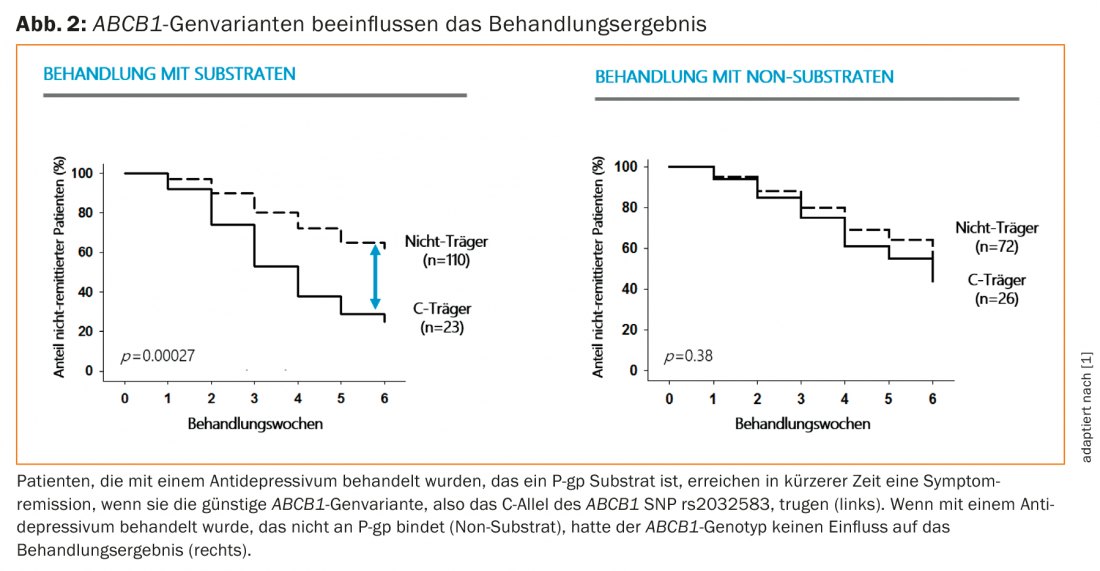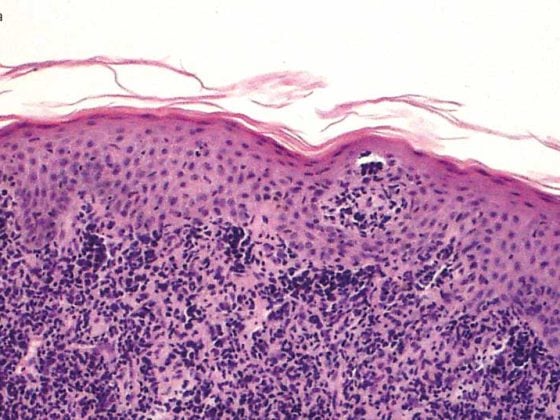Overcoming the blood-brain barrier is an important prerequisite for the efficacy of antidepressants. The essential component of the blood-brain barrier is the P-glycoprotein, which is encoded by the ABCB1 gene and prevents most antidepressants from crossing into the tissue. The human ABCB1 gene contains variants that can have a significant impact on therapeutic outcomes. Consideration of the ABCB1 test result in antidepressant treatment increases the prospect of more rapid onset of action and full remission.
Drugs that are supposed to exert their effect in the brain not only have to survive passage through the gastrointestinal tract and premature degradation in the liver. They also have to cross the blood-brain barrier, which protects the brain from being invaded by molecules that could harm the brain. The brain is in great need of protection and its nerve cells have an extremely limited capacity for regeneration. Our most precious organ is urgently dependent on a continuous supply of nutrients, because it cannot build up depots. Although it weighs only 2% of our total body weight, more than 20% of our food intake is consumed by our brain. Nutrients are supplied by a widely ramified capillary network, the total length of which amounts to an impressive 600 km. The total area of the walls of this network of capillaries is about 20 m². With such a large contact area between the bloodstream and the brain, it becomes understandable why nature had to develop a quite differentiated protective system in the form of the blood-brain barrier. Their most important component is the endothelial cells, which are held tightly together by connecting elements (“tight junctions”) and thus prevent diffusion from the blood vessels into the brain tissue. In addition to this passive protection, endothelial cells can also synthesize a large molecule, P-glycoprotein (P-gp), which actively transports most small molecules back into the bloodstream as they prepare to penetrate the vessel wall (Fig. 1).
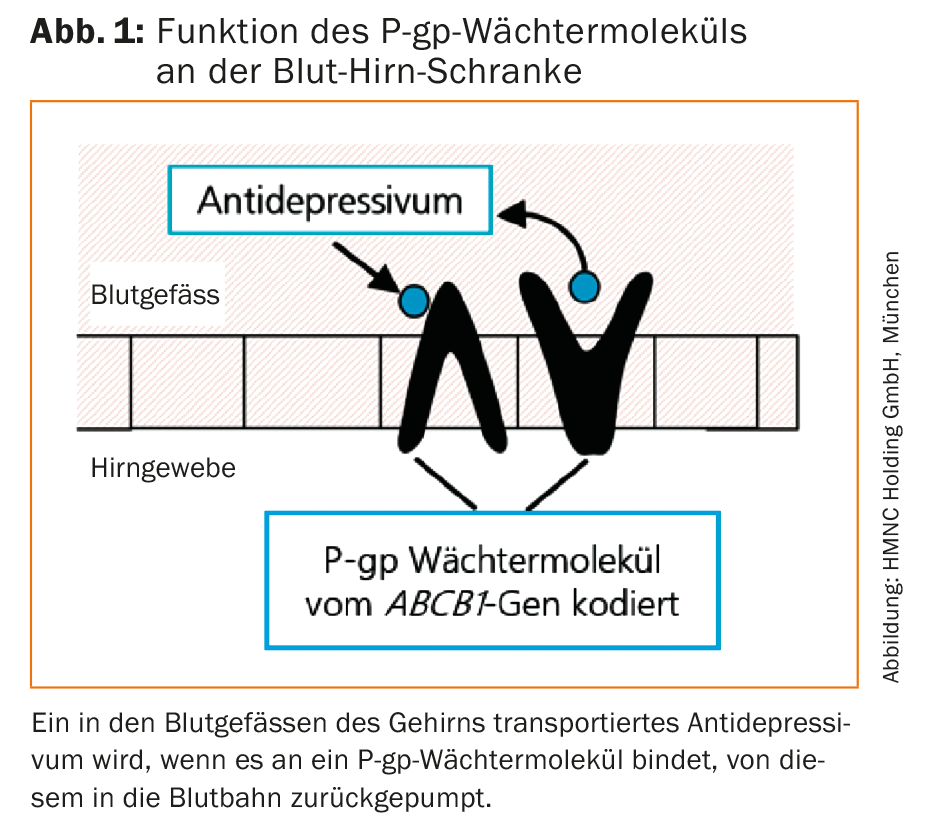
Most antidepressants also belong to these small molecules. Any antidepressant that binds to P-gp, i.e., is a substrate, is pumped back out of the cell into the interior of the capillaries by the P-gp. Thus, P-gp is a kind of “sentinel molecule” that is of considerable clinical importance not only for therapy with antidepressants but also for treatment with anti-epileptics, antipsychotics, and analgesics.
Variants of the ABCB1 genedetermine the guardian function of the P-glycoprotein
The guardian molecule P-gp is encoded by the ABCB1 gene, which has variant diversity in humans. Clock et al. 2008 [1] were the first to find an association between antidepressant treatment response and different ABCB1 gene variants. However, these differences were only observed (Fig. 2) when the antidepressant was a substrate of P-gp. Extensive research at the Max Planck Institute of Psychiatry in Munich has made it possible to identify polymorphisms of the ABCB1 genethat appear to be related to the function of this protein and thus influence whether the drug can be effective to a sufficient extent in the central nervous system. Sufficient availability of the antidepressant in brain tissue is indispensable for the desired clinical effect. The finding of Uhr et al. 2008 [1] contains another important message to those who generally doubt the clinical efficacy of antidepressants: if these drugs were ineffective, then ABCB1 gene variantswould have no effect on treatment outcome.
Clinical performance and experience with the ABCB1 test– study situation
Physicians make the decision as to which antidepressant is most suitable for the individual patient in the current phase of illness based on their knowledge of clinical studies, the patient’s individual history and their own experience. The side effect profiles of different antidepressants play a major role in physicians’ treatment decisions: an agitated patient tormented by inner restlessness is more likely to be prescribed a sedating antidepressant. The patient who is low in drive, withdrawn, and participates only sporadically in the life around him is more likely to be treated with a drive-enhancing antidepressant. Many pharmacological mechanisms of the antidepressant drugs available to us today are known; however, we do not know whether these mechanisms are also those for which the antidepressants are clinically effective. Certainly, influences on signal transduction by serotonin, norepinephrine, and dopamine play an important role in the effects of these drugs. Whether the antidepressant drug is a substrate of P-gp is attracting increasing attention in clinical research. The finding of Uhr et al. 2008 [1], that in particular the two single nucleotide polymorphisms ( [SNPs]) rs2032583 and rs2235015 of the ABCB1 geneallow prediction of whether or not a patient will respond to a prescribed antidepressant, has prompted numerous clinical trials worldwide [2–4]. In a meta-analysis across all studies testing the association between ABCB1 gene variantswith clinical response to antidepressants and including a total of 2650 patients, not only the above-mentioned SNPs but four other polymorphisms of the ABCB1 genewere considered. Breitenstein et al. 2015 [5] found that SNP rs2032583 was significantly associated with treatment outcome when treated with antidepressants that are P-gp substrates. SNP rs2235015 was also significantly associated with treatment outcome in a smaller subgroup. No significant associations were found for the other SNPs. It was concluded to focus future clinical applications of the ABCB1 assay onthe SNP rs2032583.
It is up to the treating physicians to decide whether the ABCB1 testis performed in patients right at the beginning of antidepressant therapy or only when the course is unsatisfactory. In a retrospective study by Breitenstein et al. In 2014 [6], follow-up data of patients whose ABCB1 test resultwas known at baseline were compared with follow-up data of those patients who were not tested. Knowledge of the ABCB1 testresult alone – regardless of whether the favorable or less favorable ABCB1 genotypewas present in the individual case – led to a better therapeutic outcome (Fig. 3). Patients who had an ABCB1 testat baseline had lower Hamilton Depression Scale scores at the time of hospital discharge. The measured symptom severity score on the Hamilton Depression Scale also influences the decision whether to convert inpatient treatment to outpatient therapy. The sooner a low value is achieved on this scale, the sooner the patient can be discharged from inpatient treatment.
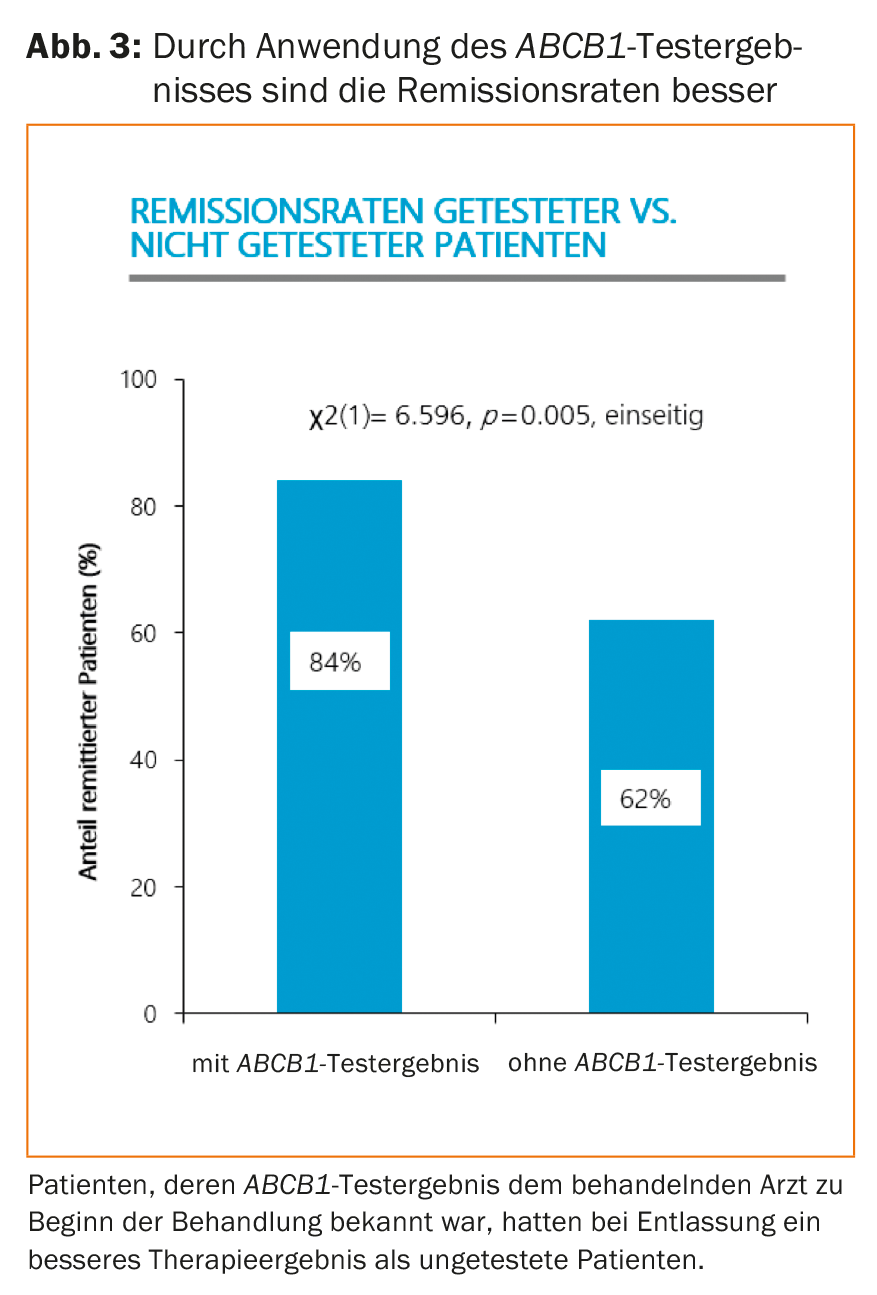
Thus, the very large body of studies available today justifies the conclusion that, in addition to the clinical assessment of which therapy is the most appropriate for the individual patient, it is useful to include the ABCB1 testand to be aware of the P-gp substrate property of the drug that is to be prescribed. To perform the test, all that is required is to send a blood sample to the clinical laboratory.
In addition to the individual benefits for the patients concerned, the more rapid response to therapy and the improved therapeutic outcome also have health economic consequences. These aspects and the improvement of the quality of care in general have led to the inclusion of the ABCB1 testin the treatment recommendations of the Swiss professional societies [7]. In Germany, too, the consideration of the ABCB1 testin the guidelines for depression treatments is being sought.
Specific treatment recommendations by ABCB1 test: P-gp substrate property and dosage of antidepressants.
Another clinical study conducted at the Max Planck Institute of Psychiatry investigated the influence of drug dosage, or drug concentration in blood plasma, in relation to ABCB1 genotypeand treatment outcome [8]. Carriers of the rare genotype (C allele of ABCB1 SNP rs2032583 and T allele of ABCB1 SNP rs2235015) (approximately 25% of all patients) were found to respond particularly well to antidepressant therapy. The prerequisites for therapeutic success were, first, that the antidepressant was a P-gp substrate and, second, that the blood plasma level of the antidepressant did not exceed the recommended normal range [9]. Patients with this ABCB1 genotypenot only responded better to antidepressants from the substrate group (Table 1) at standard doses than patients with the unfavorable genotype (TT/GG), but also significantly better than those receiving any standard therapy. In patients with the rare ABCB1 genotype (C allele of ABCB1 SNP rs2032583 and T allele of ABCB1 SNP rs2235015), if the plasma concentration of P-gp substrate exceeded the recommended normal range, the therapeutic outcome was significantly worse than within the recommended normal range. This may serve as further evidence that the rare ABCB1 genotype is associated with reduced P-gp “sentinel” function, and that this ultimately leads to too high a concentration of the drug in the brain when the plasma concentration of the drug is too high. This has negative clinical effects, mainly due to centrally induced side effects.
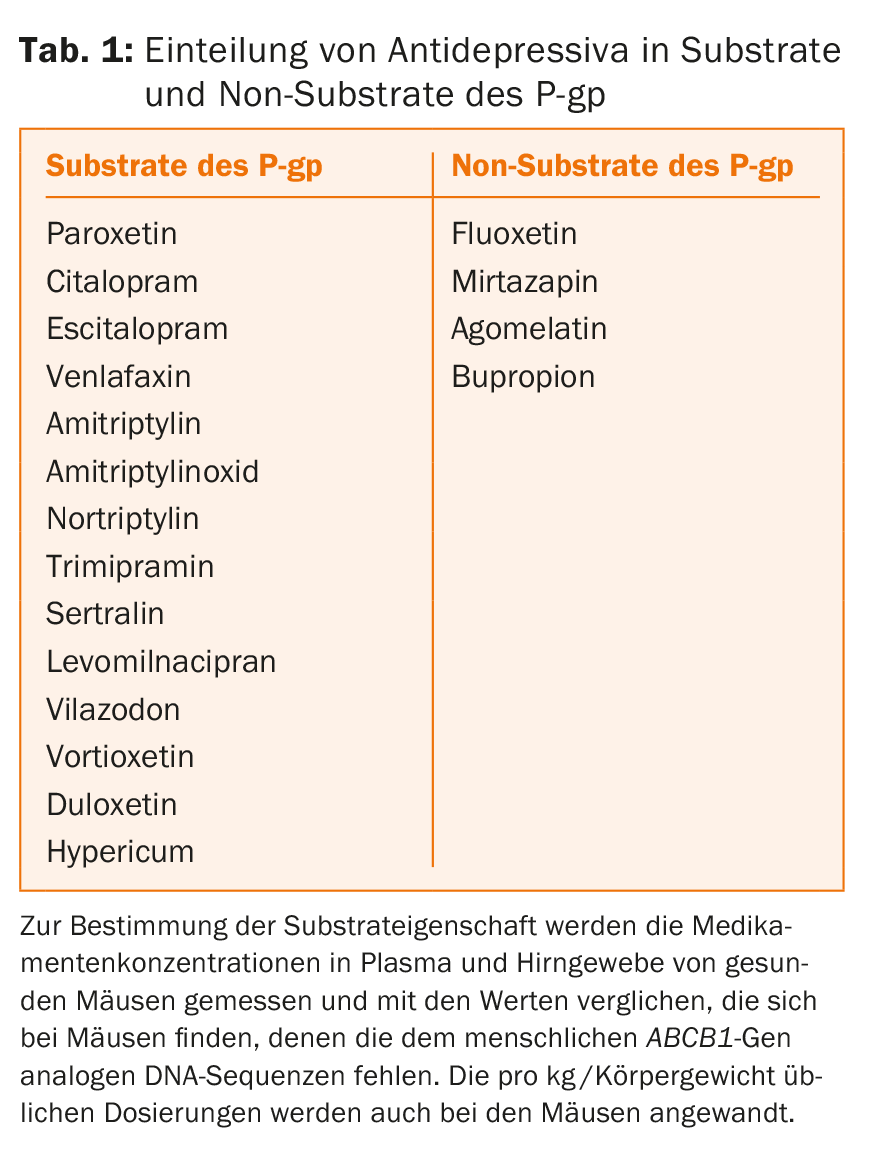
The ABCB1 test determines the individual expression of the ABCB1 SNPs rs2032583 and rs2235015 in a clinical laboratory. The relevant ABCB1 genotypesare measured in the submitted blood sample with the aid of a RIDA®-PRECISION test kit from R-Biopharm AG using the PCR method. The findings are sent to the treating physicians, including the resulting therapy recommendations. Based on these findings, we have developed a therapy scheme for practical use (Fig. 4).
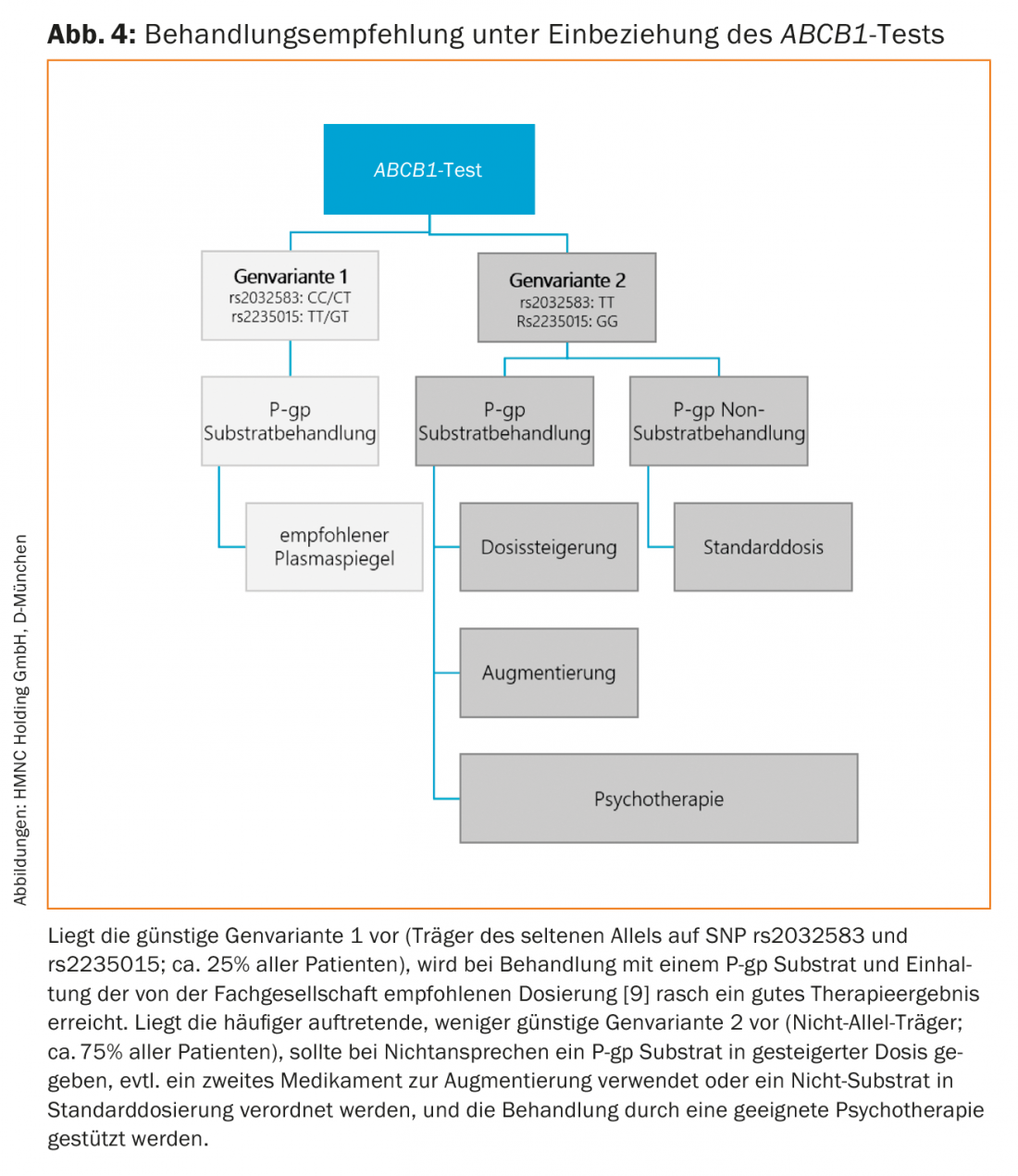
Conclusion
The treatment of depression with antidepressants is currently still unsatisfactory: it takes too long for the effect to occur, the drugs work in too few patients and there are too many side effects. The ABCB1 test allows for decision support as to which antidepressants are most likely to provide a good treatment outcome in the individual patient. The shortened duration of treatment and the prospect of complete remission, and thereby the reduced likelihood of a recurrence of a depressive episode, justify the integration of the ABCB1 test into the clinical practice of depression treatment.
Literature:
- Uhr M, et al: Polymorphisms in the drug transporter gene ABCB1 predict antidepressant treatment response in depression. Neuron 2008; 57: 203-209.
- O’Brien FE, Dinan TG, Griffin BT, Cryan JF: Interactions between antidepressants and P-glycoprotein at the blood-brain barrier: clinical significance of in vitro and in vivo findings. Br J Pharmacol 2012; 165: 289-312.
- Sarginson JE, et al: ABCB1 (MDR1) polymorphisms and antidepressant response in geriatric depression. Pharmacogenet Genomics 2010; 20: 467-475.
- Schatzberg AF, et al: ABCB1 Genetic Effects on Antidepressant Outcomes: A Report From the iSpot-D Trial. Am J Psychiatry 2015; 172: 751-759.
- Breitenstein B, et al: ABCB1 Gene Variants and Antidepressant Treatment Outcome: A Meta-analysis. Am J Med Genet Part B Neuropsychiatr Genet 2015; 168B(4): 274-283.
- Breitenstein B, et al: The clinical application of ABCB1 genotyping in antidepressant treatment: a pilot study. CNS Spectr 2014; 19: 165-175.
- Holsboer-Trachsler E, et al: The somatic treatment of unipolar depressive disorders: Update 2016, part 1. The acute treatment of depressive episodes. Switzerland Med Forum 2016; 16(35): 716-724.
- Breitenstein B, et al: Association of ABCB1 gene variants, plasma antidepressant concentration, and treatment response: results from a randomized clinical study. J Psychiatr Res 2016; 73: 86-95.
- Baumann P, et al: The AGNP-TDM Expert Group Consensus Guidelines: Therapeutic Drug Monitoring in Psychiatry. Pharmacopsychiatry 2004; 37: 243-265.
InFo NEUROLOGY & PSYCHIATRY 2016; 14(6): 36-40.


